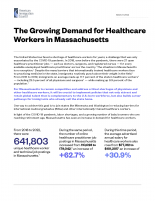- Fact Sheet
The Growing Demand for Healthcare Workers in Massachusetts
Published
New research from the American Immigration Council shows that immigrants in Massachusetts made up over 17 percent of the state’s healthcare workers despite accounting for only 9.9 percent of the overall population. The new report, The Growing Demand for Healthcare Workers in Massachusetts, highlights the contributions that immigrants make in high-demand healthcare occupations that require a professional or occupational license.
Amid rising labor shortages and an aging state workforce, Massachusetts is facing increased demand for professionally licensed workers that internationally trained immigrants can help meet. For Massachusetts to remain competitive and address critical shortages in high-demand fields, the state must implement policies that not only attract and retain immigrant talent that is complementary to the U.S.-born workforce, but also build career pathways for immigrants who already call the state home.
-
Immigrants are already helping Massachusetts meet its demand for healthcare workers. Immigrants represented 14.8 percent of registered nurses, 17.5 percent of health technicians, 24.1 percent of clinical lab technologists, and 24.6 percent of licensed practical nurses from 2015 to 2019.
-
Immigrants are uniquely positioned to provide support across all healthcare settings. From 2018 to 2022, the number of healthcare worker job postings that required bilingual skills in Massachusetts increased by over 91 percent. Internationally trained healthcare professionals often have multilingual skills, enabling them to fill those positions.
-
Immigrants’ skill sets are being underutilized in Massachusetts, leading to brain waste. Despite the need for immigrants’ skill sets, challenges such as skill recognition and a lack of re-credentialing pathways are leading to the underemployment of qualified internationally trained immigrants. From 2015 to 2019, the share of immigrants who had a biology or healthcare-related bachelor’s degree but worked in a job that did not require a bachelor’s degree was 33.4 percent. Additionally, the share of immigrants with professional and doctorate degrees working in occupations in the healthcare industry that did not require a professional or doctorate degree was 4.6 percent.
We can't let the government keep us in the dark.
Join us in demanding transparency and holding them accountable in court to protect our democracy.
Donate Now
